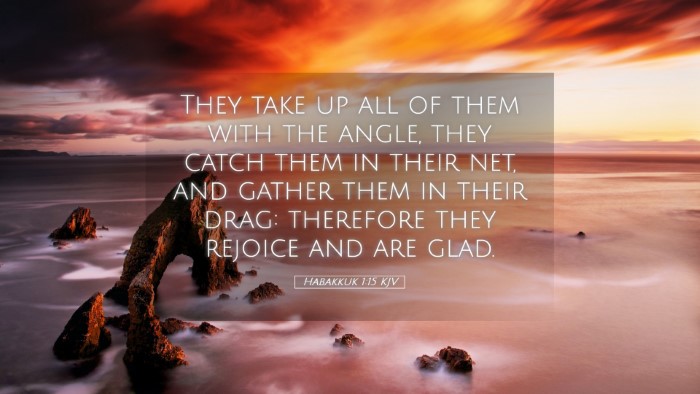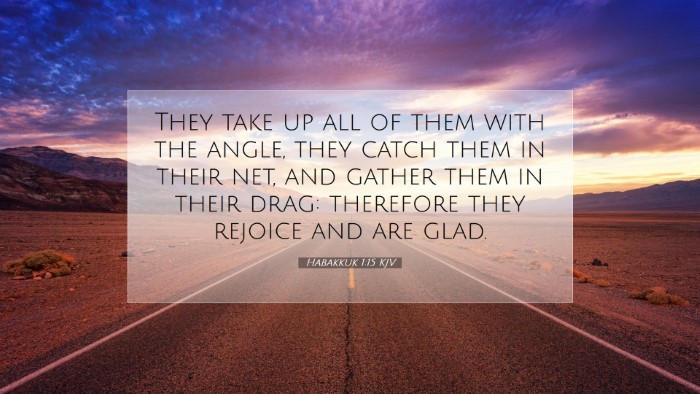Old Testament
Genesis Exodus Leviticus Numbers Deuteronomy Joshua Judges Ruth 1 Samuel 2 Samuel 1 Kings 2 Kings 1 Chronicles 2 Chronicles Ezra Nehemiah Esther Job Psalms Proverbs Ecclesiastes Song of Solomon Isaiah Jeremiah Lamentations Ezekiel Daniel Hosea Joel Amos Obadiah Jonah Micah Nahum Habakkuk Zephaniah Haggai Zechariah MalachiHabakkuk 1:15
Habakkuk 1:15 KJV
They take up all of them with the angle, they catch them in their net, and gather them in their drag: therefore they rejoice and are glad.
Habakkuk 1:15 Bible Commentary
Commentary on Habakkuk 1:15
Verse: "They take up all of them with the angle; they catch them in their net, and gather them in their drag: therefore they rejoice and are glad."
Introduction
This verse, situated in the prophetic book of Habakkuk, draws attention to the means by which oppressors capture their prey. As one of the minor prophets, Habakkuk grapples with profound theological questions regarding divine justice in the face of rampant wickedness. Scholars and theologians have drawn rich insights from this prophecy, particularly from verse 15, which metaphorically conveys the methods of the Chaldeans in exploiting nations and peoples.
Historical Context
This verse is situated during a time of great turmoil for Israel, as they faced the impending threat from the Babylonians. Understanding the historical context is crucial; Habakkuk's lamentation arises from his struggle to comprehend the delay of justice and the apparent success of the wicked.
Key Themes
- The Methods of Oppression: The Chaldeans, represented as fishermen, demonstrate the calculated and pervasive nature of their conquest.
- The Rejoicing of the Wicked: Their success leads to jubilation, highlighting a stark contrast between their actions and the suffering of those they oppress.
- Divine Silence: God’s delayed response becomes a central theme as Habakkuk questions why such evil seems to prosper.
Commentary Insights
Matthew Henry
Matthew Henry comments on this verse by emphasizing the craftiness of the Chaldeans, noting how they ensnare their victims with great skill, much like fishermen who use nets and angles to collect fish. This metaphor illustrates their methodical approach to conquest, teaching us about the strategies employed by tyrants and the dangers of complacency in the face of wickedness.
Henry further reflects on the emotional response of these oppressors, pointing out how their success fills them with joy. This invites a reflection on the moral implications of their actions—how the prosperity of the wicked starkly contrasts with the suffering of the innocent.
Albert Barnes
Albert Barnes elaborates on the imagery of fishing used in this verse, drawing parallels between the capturing of fish and the captivity of nations. He points out that just as fishermen utilize nets to gather their catch, so too do the Chaldeans use military force and cunning to ensnare their enemies. Barnes also highlights the expectation of divine intervention that is heavily felt throughout Habakkuk, questioning why God seems indifferent to such actions.
Moreover, Barnes stresses that the rejoicing of the Chaldeans serves to forewarn the people of Judah about the pervasive evil that surrounds them, and underscores the danger of underestimating the deprivation and destructiveness of ungodly powers.
Adam Clarke
Adam Clarke provides a detailed examination of the language within the verse, noting how the terms used convey a sense of entrapment and despair. He interprets the involvement of angles and nets as a rich metaphor for the deception employed by oppressors in achieving their ends. Clarke points out that this imagery serves to illustrate the elaborate schemes wicked individuals employ to justify their actions and the suffering this brings upon others.
Clarke also addresses the spiritual implications of the rejoicing mentioned in the verse, asserting that it mirrors the attitudes of those who prosper through injustice. This commentary provokes a deeper reflection on the nature of true joy and fulfillment, contrasting it with momentary pleasures achieved through cruelty.
Theological Reflections
When contemplating Habakkuk 1:15, pastors and theologians are urged to recognize the necessity of grappling with the juxtaposition of divine justice against the success of evil. This verse serves as a reminder that, even amidst trials and suffering, God remains sovereign and aware of human condition.
Application for Today
- Encouragement for the Oppressed: This verse resonates with those who find themselves under oppression—offering hope that their plight is seen and that justice will be served.
- Call to Vigilance: Believers are encouraged to be acutely aware of the strategies employed by the wicked, learning to navigate their own spiritual lives with discernment.
- Affirmation of Divine Justice: Despite the seemingly prosperous situations of oppressors, this passage affirms the belief that God will ultimately execute justice in His time.
Conclusion
Habakkuk 1:15 serves not only as a historical account of oppression but also as a potent reminder of the struggle between good and evil. The insights from esteemed commentators reflect the necessity of confronting these themes head-on, provoking deeper understanding and engagement with the complexities of faith, justice, and divine sovereignty.


